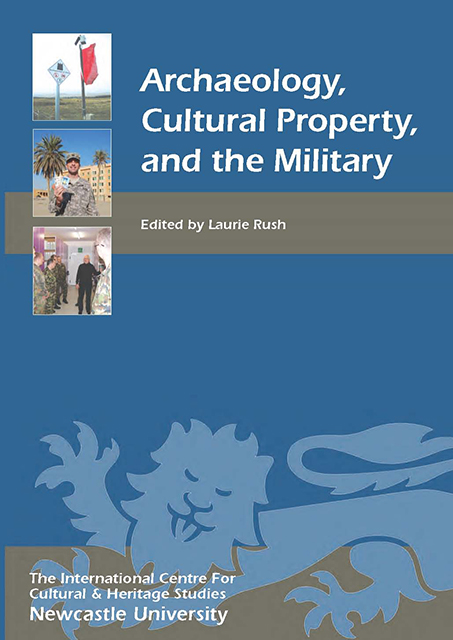Book contents
- Frontmatter
- Contents
- List of Illustrations: Figures and Tables
- Archaeology and the Military: An Introduction
- 1 The Obligations Contained in International Treaties of Armed Forces to Protect Cultural Heritage in Times of Armed Conflict
- 2 Rescuing Europe’s Cultural Heritage: The Role of the Allied Monuments Officers in World War II
- 3 The UK’s Training and Awareness Programme
- 4 US Army Civil Affairs: Protecting Cultural Property, Past and Future
- 5 Cultural Property Protection in the Event of Armed Conflict: Deploying Military Experts or Can White Men Sing the Blues?
- 6 Good Training and Good Practice: Protection of the Cultural Heritage on the UK Defence Training Estate
- 7 In-Theatre Soldier Training through Cultural Heritage Playing Cards: A US Department of Defense Example
- 8 Dealing the Heritage Hand: Establishing a United States Department of Defense Cultural Property Protection Program for Global Operations
- 9 Teaching Cultural Property Protection in the Middle East: The Central Command Historical/Cultural Advisory Group and International Efforts
- 10 Cultural Resources Data for Heritage Protection in Contingency Operations
- 11 Time not on my Side: Cultural Resource Management in Kirkuk, Iraq
- 12 US Military Support of Cultural Heritage Awareness and Preservation in Post-Conflict Iraq
- 13 Operation Heritage
- 14 Cultural Property Protection in the Event of Armed Conflict – Austrian Experiences
- 15 The Role of the Swiss Armed Forces in the Protection of Cultural Property
- 16 Preserving Global Heritage from Space in Times of War
- Appendix 1 1954 Hague Convention and its two Protocols
- Appendix 2 Author Biographies
- Index
6 - Good Training and Good Practice: Protection of the Cultural Heritage on the UK Defence Training Estate
Published online by Cambridge University Press: 28 February 2023
- Frontmatter
- Contents
- List of Illustrations: Figures and Tables
- Archaeology and the Military: An Introduction
- 1 The Obligations Contained in International Treaties of Armed Forces to Protect Cultural Heritage in Times of Armed Conflict
- 2 Rescuing Europe’s Cultural Heritage: The Role of the Allied Monuments Officers in World War II
- 3 The UK’s Training and Awareness Programme
- 4 US Army Civil Affairs: Protecting Cultural Property, Past and Future
- 5 Cultural Property Protection in the Event of Armed Conflict: Deploying Military Experts or Can White Men Sing the Blues?
- 6 Good Training and Good Practice: Protection of the Cultural Heritage on the UK Defence Training Estate
- 7 In-Theatre Soldier Training through Cultural Heritage Playing Cards: A US Department of Defense Example
- 8 Dealing the Heritage Hand: Establishing a United States Department of Defense Cultural Property Protection Program for Global Operations
- 9 Teaching Cultural Property Protection in the Middle East: The Central Command Historical/Cultural Advisory Group and International Efforts
- 10 Cultural Resources Data for Heritage Protection in Contingency Operations
- 11 Time not on my Side: Cultural Resource Management in Kirkuk, Iraq
- 12 US Military Support of Cultural Heritage Awareness and Preservation in Post-Conflict Iraq
- 13 Operation Heritage
- 14 Cultural Property Protection in the Event of Armed Conflict – Austrian Experiences
- 15 The Role of the Swiss Armed Forces in the Protection of Cultural Property
- 16 Preserving Global Heritage from Space in Times of War
- Appendix 1 1954 Hague Convention and its two Protocols
- Appendix 2 Author Biographies
- Index
Summary
The impetus to effectively train soldiers has been recognised for thousands of years. Writing in AD 390, the Roman military theorist Vegetius set out his belief that:
Victory in war does not depend entirely upon numbers or mere courage; only skill and discipline will insure it. We find that the Romans owed the conquest of the world to no other cause than continual military training, exact observance of discipline in their camps and unwearied cultivation of the other arts of war (Vegetius 1767, I: 1).
The courage of a soldier is heightened by his knowledge of his profession, and he only wants an opportunity to execute what he is convinced he has been perfectly taught. A handful of men, inured to war, proceed to certain victory, while on the contrary numerous armies of raw and undisciplined troops are but multitudes of men dragged to slaughter (op cit, I: 2).
Over the centuries military authorities have taken these precepts to heart and today professional military forces seek to ensure that training is both relevant and as authentic as possible. As a result, the British military has a variety of landscape and terrain available to it both in the UK and further afield, which provides the environment for all aspects of training, from basic fieldcraft for new recruits through trade training such as engineering or gunnery to full mission rehearsal ahead of operational deployment.
DEFINING THE RESOURCE
The Defence Training Estate (DTE) is part of Defence Estates (DE). DE is a government agency responsible for the administration of land held and used by the Ministry of Defence (MoD). The Estate includes some 130 training areas and ranges in England, Scotland and Wales (Parliament 2007) which range from the large landscape areas, such as Salisbury Plain (28,000 hectares) and Otterburn (23,000 hectares), to individual sites such as the disused World War II munitions store at Yardley Chase (186 hectares). Many of these sites include ground taken into military use prior to World War II and, as such, represent rural areas that have not experienced the levels of development and agricultural intensification seen elsewhere in western Europe following World War II and notably, in the agricultural sector, the industrialisation of farming under the aegis of the European Union.
- Type
- Chapter
- Information
- Archaeology, Cultural Property, and the Military , pp. 60 - 72Publisher: Boydell & BrewerPrint publication year: 2010
- 5
- Cited by



